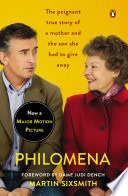I already published a review of the film, Philomena, for Roar so the following is primarily a review of the book, but also serves as a comparison between the book and its film adaptation. The changes in the book’s title, which was originally published under the following title The Lost Child of Philomena Lee: A Mother, Her Son, and a Fifty-Year Search then changed to Philomena: A Mother, Her Son, and a Fifty-Year Search as a movie tie-in, tells you all that you need to know about the differences between the book and the movie. If I am being charitable, the movie is an expansion of the book’s epilogue and a couple of scattered chapters and focuses on the mother and author’s perspective during the search with a ton of dramatic liberties thrown in. If I am cynical, the movie privileges and centers the heterosexual characters, especially and including the author, Martin Sixsmith, who never privileged himself in his own narrative, and pushes the main character, the homosexual son, to the margins of the story out of fears of not attracting an audience. So in spite of the film’s moralizing about society’s attitude towards sex, it is just as complicit as any Republican administration or the Catholic Church.
Philomena: A Mother, Her Son, and a Fifty-Year Search is a book that simultaneously tells the story of Sixsmith’s search and the process of how before Anthony Lee was even born, he became Michael Hess. As an author, Sixsmith remains invisible even though he occasionally appears as a character in his book. He never indulges in expressing his feeling about the situation, but is trying to explain what happened. The majority of the book is told in chronological order. The early chapters do focus more on Philomena than her child, but they also focus on the people behind the bureaucracy that created a system that enslaved their own pregnant women and sold their babies to the highest bidder. Whenever the book judiciously departed from chronological order to reveal how Sixsmith got the information, it only enhances the narrative, not muddies it like Shrabani Basu’s Victoria & Abdul: The True Story of the Queen’s Closest Confidant, another book adapted by Stephen Frears and Judi Dench.
I became completely absorbed in the narrative once Sixsmith devoted all his energies to depicting Michael’s life, and my reading picked up momentum from that moment on. Sixsmith is excellent at conveying a situation and all the perspectives without making his reader pick a side. Even as Michael does questionable things in his career and personal life, Sixsmith steadily keeps his focus on him without flinching, which is particularly laudable considering that Sixsmith is a heterosexual man, and Michael was not only gay, he also occasionally indulged in wilder behavior that shocked his partners. Most heterosexual men would have floundered at gay and clutched their pearls.
Considering that Philomena: A Mother, Her Son, and a Fifty-Year Search is filled with stories that the various real life people tried to keep quiet for all sorts of reasons, this book is more remarkable than Sixsmith suggests. Sixsmith makes his work seem more like compilation of various primary sources and interviews. He is not an editor of an anthology. Sixsmith crafts a riveting, intimate narrative only second to Erik Larson in merging disparate sources into a comprehensive biography of a system and a life while never losing sight of the greater significance of these stories in terms of national politics, cultural norms and religion. If you enjoyed the movie, then you will love the book, which is far superior in quality and logic.

Philomena: A Mother, Her Son, and a Fifty-Year Search
Stay In The Know
Join my mailing list to get updates about recent reviews, upcoming speaking engagements, and film news.




